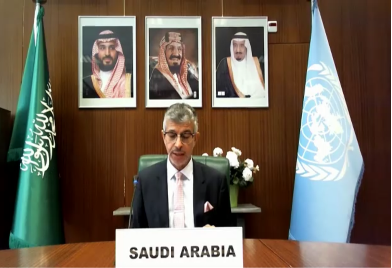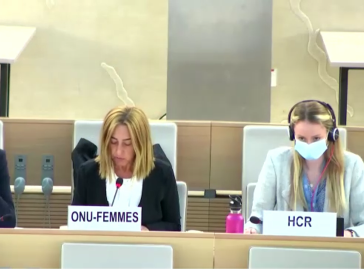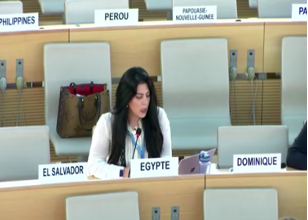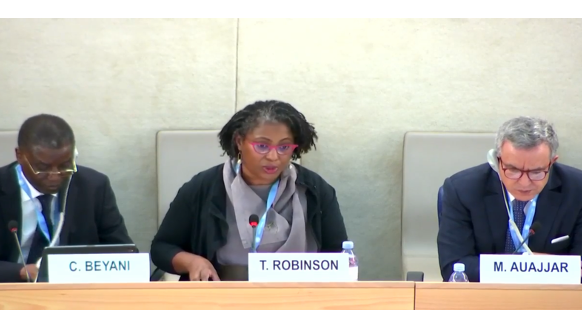The 50th Session of the Human Rights Council
13 June – 8 July 2022
Item 10 : Technical assistance and capacity-building
6th July 2022
By Yasmine Titouni/ GICJ
Executive Summary
During an Interactive Dialogue at the 50th Human Rights Council (HRC) session on 6th July 2022, Mr Mohamed Auajjar, Chair of the fact-finding Mission (FFM) on Libya, presented his preliminary findings and engaged with various member-states who expressed their opinions on the human rights situation in Libya. The leader of the FFM in Libya emphasised, among other things, systematic violations, and abuses of human rights against men, women, children, internal and external migrants, and inmates in official and unofficial detention facilities. Many delegations praised the work of the fact-finding team and thanked the Libyan government for its cooperation and collaborative efforts with the international community during the interactive session.
 After hearing the statements of several delegations, Mr Mohamed Auajja, head of the fact-finding Mission addressed the diverse concerns raised by countries. He was appreciative of the participants' articulation of obstacles and limiting issues concerning n interventions. Ms Robinson, one of the members of the FFM stated that it exceeded expectations of what she and her colleagues thought they would be able to achieve. She further added that the cooperation of Libyan authorities was crucial to the reform and growth of Libyan institutions. The proposed creation of a special tribunal for the atrocities committed in Tahuna was outlined and discussed. As the report gathers evidence of kidnappings, murder, and torture in Tarhuna, this tragic episode, constitutes one of the most egregious instances of human rights violations since Muammar Gaddafi's overthrow in 2011. Emanating from a universal consensus, it was urged that those responsible for perpetrating crimes in Tahuna must be held accountable by a reformed judicial system. The FFM offered the first suggestions for the formation of a special tribunal inside the Libyan legal system. In addition, the Mission called on the international community to increase its coordination with the Libyan government by committing to prompt action, steadfast support of the democratic transition and promotion of democratic elections in Libya. Since 2016, the armed conflict in Libya has been the focal point of the FFM’s comprehensive report. The panellists participating in the Interactive Dialogue identified violations of international humanitarian law including direct attacks on civilians, sexual violence, enforced disappearances, and displacement. They further concluded that since 2016, the rights of Libyan women and children as well as cases of arbitrary detention, continue to be neglect
After hearing the statements of several delegations, Mr Mohamed Auajja, head of the fact-finding Mission addressed the diverse concerns raised by countries. He was appreciative of the participants' articulation of obstacles and limiting issues concerning n interventions. Ms Robinson, one of the members of the FFM stated that it exceeded expectations of what she and her colleagues thought they would be able to achieve. She further added that the cooperation of Libyan authorities was crucial to the reform and growth of Libyan institutions. The proposed creation of a special tribunal for the atrocities committed in Tahuna was outlined and discussed. As the report gathers evidence of kidnappings, murder, and torture in Tarhuna, this tragic episode, constitutes one of the most egregious instances of human rights violations since Muammar Gaddafi's overthrow in 2011. Emanating from a universal consensus, it was urged that those responsible for perpetrating crimes in Tahuna must be held accountable by a reformed judicial system. The FFM offered the first suggestions for the formation of a special tribunal inside the Libyan legal system. In addition, the Mission called on the international community to increase its coordination with the Libyan government by committing to prompt action, steadfast support of the democratic transition and promotion of democratic elections in Libya. Since 2016, the armed conflict in Libya has been the focal point of the FFM’s comprehensive report. The panellists participating in the Interactive Dialogue identified violations of international humanitarian law including direct attacks on civilians, sexual violence, enforced disappearances, and displacement. They further concluded that since 2016, the rights of Libyan women and children as well as cases of arbitrary detention, continue to be neglect
Geneva International Centre for Justice (GICJ) urges immediate action to educate Libyans about their right to justice and to receive compensation. The international community and the Libyan government must work together to combat sexual and gender-based violence by "removing legal and institutional barriers that prevent its reporting." Providing victims with access to rehabilitation programmes and justice, publicly denouncing all types of gender-based violence, and holding offenders accountable should be among the steps taken to address these issues.
Background
On 22nd June 2020, the HRC established the Independent FFM in Libya through resolution 43/39 for a one-year term to investigate violations and abuses of human rights committed by all parties since the beginning of 2016. The aim of this mission was to “prevent further deterioration of the human rights situation and ensure accountability.” On 5th October 2020, the FFM gave the HRC an oral update, which later led to an extension of the mandate through the resolution 45/113. However, the implementation of several HRC mandates, including the Libyan FFM was postponed, due to the UN Secretariat's funding shortage and the limits imposed by COVID-19. The Libyan FFM's tenure was extended until September 2021. On 7th October 2021, the FFM issued a formal report to the HRC to facilitate its execution. On 11th October 2021, the HRC extended the mandate of the FFM for an additional nine months (Resolution 48/25). The FFM submitted its most recent report to the HRC at its 50th session in June 2022.
Since the North Atlantic Treaty Organisation's (NATO) allies intervene in Libya, in 2011, the nation has since been plagued by anarchy and recurring bouts of violence. Six years after the revolt that collapsed Gaddafi's rule, Libya continues to experience violent political rifts and severe instability, which have contributed to a wide range of social and economic issues. After a short period of relative stability, the conflict reignited in the summer of 2014 and led to a severe loss of life and caused the internal displacement of more than 400,000 Libyans. As highlighted in the FFM report, the presence of approximately 300,000 foreigners including refugees and migrants originating from Libya, desperately trying to reach Europe by sea is a further obstacle that has exacerbated social tensions in the country. Since 2014, armed conflict and social chaos have contributed to a rise in indiscriminate bombardment of civilian areas, summary killings, torture, and destruction of property throughout the country.
The Report
On the 6th 0f July 2022, a debate about technical assistance and capacity-building in the scope of human rights was held in Libya. Resolution 48/25 directed the FFM on Libya to compile a report on the human rights situation in Libya and deliver it to the HRC at its 51st Session.
Covering a period beginning in 2016, the report focused on the alleged violations and abuses of international human rights law and international humanitarian law by all parties in Libya, as well as the need to preserve evidence so perpetrators of violence and human rights abuses can be held accountable for their actions. The Mission, which was established at the request of the Libyan government to support the aspirations of the Libyan people for justice, national reconciliation, respect for human rights, and the rule of law, uncovered clear patterns of human rights violations and abuse against men, women, and children, as well as internal and external migrants, and prisoners in official and unofficial detention facilities.
Due to the COVID-19 pandemic, United Nations funding was limited, and other administrative impediments, including the recruitment of personnel, were constrained. Accordingly, the Mission's operating time has been drastically reduced.
The absence of political stability has also led to the revival of military engagements and war, although to varying degrees in the east, west, and south of the country. This includes a non-international military war between the Libyan National Army (LNA) and the General National Congress (GNC), both of which have been supported by external factors from April 2019 to June 2020. According to the report, the HRC “urged that the Libyan authorities immediately provide the Mission with complete access to all of Libya's territory and enable it to visit places."
Interactive Dialogue Ms. Lamia Fathi Abusedra, the delegate of Libya, expressed her gratitude for the Mission's work on promoting unification and protection. She also reassured member-states that Libya remained fully committed to the fight against inhumanity and the advancement of human rights, as both are rooted in the core "values embedded in Libya’s constitutional documents and emanating from the teachings of Islam”. The Libyan delegation said that their efforts were demonstrated through the adoption of 533 cabinet decisions that call for the creation of a permanent international framework for the drafting of a national strategy to promote human rights. They reiterated their decision to extensively implement the recommendations of the FFM and the UPR to pave their path towards achieving democracy, universal human rights, reconciliation, and justice.
 The delegation expressed gratitude for the international community's support and technical aid. While Libya has interacted with the HRC and FFM members with a spirit of cooperation, it is important to highlight that the FFM is only possible due to a national initiative that is wholly Libyan-owned, and it is vital that the will of the state of Libya be respected when defining the term and mandate of the FFM. According to the delegate, the route towards ensuring human rights protection is arduous and continuing; consequently, the Libyan government appreciates the 9-month extension of the FFM. However, it is crucial that the FFM produces the final report, scheduled to be delivered ahead of the 51st HRC session. The report must adhere to Libya's tradition, culture, and the geopolitical situation. The Mission informed the assembly of the HRC that foreign technical support must be maintained, if not increased, in the country. The delegate from Libya, reaffirmed its full support of the mandate as they evaluate the human rights situation in Libya as deeply concerning. They shed light on the speed at which the civic space has shrunk, and politically motivated violence spread in Libyan cities. In the eyes of the Libyan delegation, the objectives of the FFM have not yet been achieved. Efforts must be maintained and strengthened in the Libyan region.
The delegation expressed gratitude for the international community's support and technical aid. While Libya has interacted with the HRC and FFM members with a spirit of cooperation, it is important to highlight that the FFM is only possible due to a national initiative that is wholly Libyan-owned, and it is vital that the will of the state of Libya be respected when defining the term and mandate of the FFM. According to the delegate, the route towards ensuring human rights protection is arduous and continuing; consequently, the Libyan government appreciates the 9-month extension of the FFM. However, it is crucial that the FFM produces the final report, scheduled to be delivered ahead of the 51st HRC session. The report must adhere to Libya's tradition, culture, and the geopolitical situation. The Mission informed the assembly of the HRC that foreign technical support must be maintained, if not increased, in the country. The delegate from Libya, reaffirmed its full support of the mandate as they evaluate the human rights situation in Libya as deeply concerning. They shed light on the speed at which the civic space has shrunk, and politically motivated violence spread in Libyan cities. In the eyes of the Libyan delegation, the objectives of the FFM have not yet been achieved. Efforts must be maintained and strengthened in the Libyan region.
The delegation of the European Union emphasised that the extension of this mandate provides a chance to expand the collaboration and capacity-building efforts of the FFM in Libya. The European Union emphasised that the FFM shed light on Libya's grave human rights situation. While the number of foreign combatants on Libyan territory has decreased, the complete evacuation desired by the international community has not yet occurred. The EU demands an immediate end to extradition, rape, and the arbitrary arrests that continue to occur with impunity and offers its full support.
 Saudi Arabia welcomed, on behalf of the Golf Collaboration Council, the Libyan authorities' informative collaboration with the FFM team and the efforts they made to facilitate the Mission's work in the region. The Gulf Cooperation Council appreciated the resolution suggestion made by the African group. Seeking comprehensive solutions to the Libyan issue, the delegates reaffirmed the need to pursue joint efforts to promote justice, provide technical assistance, and institutional capacity-building in Libya.
Saudi Arabia welcomed, on behalf of the Golf Collaboration Council, the Libyan authorities' informative collaboration with the FFM team and the efforts they made to facilitate the Mission's work in the region. The Gulf Cooperation Council appreciated the resolution suggestion made by the African group. Seeking comprehensive solutions to the Libyan issue, the delegates reaffirmed the need to pursue joint efforts to promote justice, provide technical assistance, and institutional capacity-building in Libya.
 The UN Women representative addressed the increasing number of women’s human rights abuses. They briefed the other delegations on the prevalence of sexual and gender-based violence in civil society and online. Given that true advances toward democracy cannot be accomplished until women play a vital role in Libya's political landscape, the UN Women's delegation pushed for a 30 per cent female presence quota in Libya's political arena. As women remain underrepresented in Libya, debates on human rights protection must take precedence over other issues.
The UN Women representative addressed the increasing number of women’s human rights abuses. They briefed the other delegations on the prevalence of sexual and gender-based violence in civil society and online. Given that true advances toward democracy cannot be accomplished until women play a vital role in Libya's political landscape, the UN Women's delegation pushed for a 30 per cent female presence quota in Libya's political arena. As women remain underrepresented in Libya, debates on human rights protection must take precedence over other issues.
The Sudanese delegation delivered their statement in line with those of the African and Arabic delegations, expressing gratitude for the Mission's work and taking note of its observations. They emphasised the importance of the complete territorial integrity and independence of Libya, as well as its recognition in the international community.
 The Egyptian delegation expressed their conviction that the realisation of human rights in Libya is possible if solid institutions are established. They stated that the final Mission should concentrate on the goals that were reinforced during the meeting and that member-states should consider the FFM's findings with cautious attention.
The Egyptian delegation expressed their conviction that the realisation of human rights in Libya is possible if solid institutions are established. They stated that the final Mission should concentrate on the goals that were reinforced during the meeting and that member-states should consider the FFM's findings with cautious attention.
The United States of America’s delegate congratulated the FFM for its contribution and reaffirmed that the fulfilment of human rights is a crucial component of the international community's obligation to Libya's civil society. The American delegation appreciated the transitional justice initiatives conducted by Libya and emphasised the importance of Libya's willingness to collaborate with all parties to the FFM as well as the next session. They asked the HRC what possible actions the international community could take to support Libya's efforts to promote accountability and transitional justice.
 NGOs and NHRI: Numerous NGOs and national human rights institutions shared their perspectives on the situation in Libya. They criticise the Libyan government for the crimes that have been perpetrated with impunity and witnessed by the Libyan forces since 2016 in the state. The immediate consequences of such acts include national outrage, power failures, failing institutions, and the expansion of armed organisations.
NGOs and NHRI: Numerous NGOs and national human rights institutions shared their perspectives on the situation in Libya. They criticise the Libyan government for the crimes that have been perpetrated with impunity and witnessed by the Libyan forces since 2016 in the state. The immediate consequences of such acts include national outrage, power failures, failing institutions, and the expansion of armed organisations.
Concerning the 9-month duration of the upcoming FFM in Libya, the relevance of a '9-month only' renewal of the FFM has been collectively questioned and many argued that it sends a dangerous message to Libyan armed groups that the international community lacks the will to ensure a sustained and serious accountability process.
All state delegations and NGOs who spoke sought alternative solutions to the long-standing and pressing human rights issues outlined during the session in Libya without hampering the previous changes that had been implemented.
Position of Geneva International Centre for Justice
Geneva International Centre for Justice (GICJ) acknowledges Libya's request for the Mission to assist national authorities in their efforts to investigate human rights violations. GICJ urges immediate action to inform Libyans of their right to seek justice and reparations. The international community and the government of Libya must combine their efforts to combat sexual and gender-based violence by removing legal and structural barriers that prevent its reporting. Measures taken to address these issues should include providing victims with access to rehabilitation resources, ways to publicly denounce all types of gender-based violence and holding offenders accountable for their crimes.
Libyan civil society has continuously emphasised its demand for peace, justice, and reconciliation. GICJ believes that such a transition must take the form of a sustainable process that results in ending impunity, guaranteeing the independence of the judiciary, and ensuring effective state oversight over the security sector. Urgent action is required to allow victims in Libya to exercise their rights to truth, justice, and reparations.
HRC50, Libya, Interactive Dialogue, Human Rights Council, Justice, Human Rights, Geneva, Geneva4justice, GICJ, Geneva International Centre for Justice







